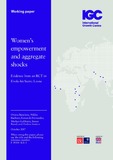Women’s empowerment and aggregate shocks: Evidence from an RCT in Ebola-Hit Sierra Leone
Abstract
The condition of women in developing countries is characterized by low economic empowerment and limited agency over their body. This paper evaluates a policy intervention aimed at relaxing these constraints for adolescent girls in Sierra Leone. The empowerment and livelihood for adolescents (ELA) intervention provides young women with a safe space where they can find support, access vocational training and information on reproductive health. The evaluation tracks 4,700 young women in 200 villages. Unexpectedly, the post-baseline period coincided with the 2014 Ebola outbreak in West Africa, the most severe ever recorded. Compounding the epidemic’s health costs, the closure of all schools and mobility restrictions resulted in acute disruptions to socio-economic life. The analysis leverages the cross-village variation in severity of disruptions and random assignment to the ELA program to document the impact of the aggregate Ebola shock on young women, and the ameliorating role played by the program. In control villages, higher exposure to Ebola-related disruption correlates with a 20 percentage points drop in school enrollment for girls aged 12-15. Early marriage and fertility rose. These adverse effects on the 12-15 years old cohort are muted in ELA treated villages. The results show how such interventions can help younger adolescent girls cope with aggregate shocks.

